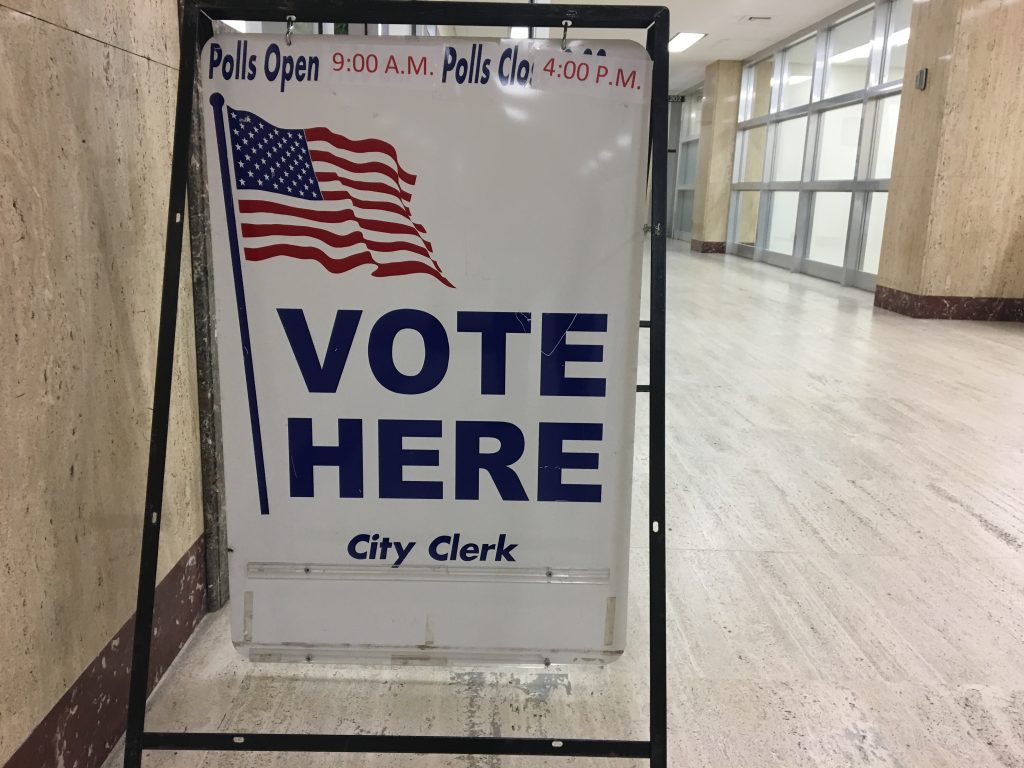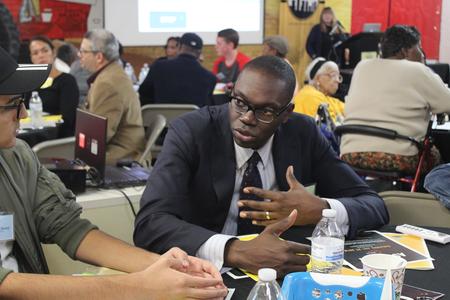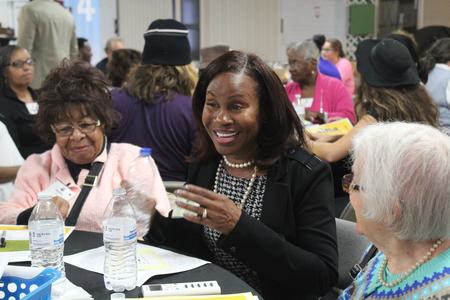The Detroit Clerk’s Race
Voting, last year’s problems, and community engagement are on the minds of candidates for city clerk.

Detroit Today with Stephen Henderson aired extended interviews with the two candidates for Detroit City Clerk. Click here to hear Janice Winfrey. Click here to hear Garlin Gilchrist II. Click here to read the Winfrey transcript. Click here to read the Gilchrist transcript.
WDET’s Voter Guide “City Clerk” page, with video of the candidates, is here.
Last year’s state audit found problems with “human error” in Detroit’s election process but no outright fraud or issues that would have changed any outcomes.
View the full audit here.
Whether the Detroit City Clerk, Janice Winfrey, who oversaw the election, will lose her job over those problems will be part of what Tuesday’s voting will determine.
The three-term clerk, who herself ousted an incumbent in 2005, is facing a challenge from Garlin Gilchrist II, who worked most recently in Mayor Mike Duggan’s administration.
At a recent Citizen Detroit event, both candidates appeared, spoke and met voters.
The six-foot-eight Gilchrist introduced himself and explained what else – in addition to his height — is behind his campaign motto that reads “standing tall for Detroit.” He also referenced the 2016 election issues.
“I want to work as your city clerk to fix the broken systems of how we prepare the people who step up to work our polling locations, to serve you and be educated about what state law is, to know what happens when something goes wrong,” he said. “I’m a person who wants to fix and make sure you have information about what the government is doing.”

The campaign is not the first place Gilchrist has talked about bridging the seemingly growing gap between city government and citizens. But the 34-year-old native Detroiter is new to the city’s voters. After earning degrees in computer engineering and computer science at the University of Michigan, he worked in Seattle and Washington D.C. as a political organizer with MoveOn.org and on President Obama’s campaigns. Then Gilchrist moved home with his wife and now-four-year-old twins to work in Duggan’s administration.
Gilchrist was the city’s technology director for civic community engagement, and he was part of creating the city’s open data portal, which lets anyone online access records such as crime reporting and business licenses.
In August, Garlin surprised many by finishing second in the primary, beating Heaster Wheeler – the former director of the Detroit NAACP and a more well-known name. Gilchrist did it, in part, by raising campaign funds from around the country. To date, he has outraised his opponent by nearly ten to one. But Gilchrist says the focus of his campaign is city residents.
“We believed that we could run a campaign that just contacted Detroiters directly that wasn’t reliant in the beginning on institutional support that was said that we can make and build direct relationships with Detroiters in person,” he says. “On their porches, calling them on the phone, sending them text messages, using social media. Going where people are was important.”
From two neighborhood campaign offices – one on the east side, one on the west side — Gilchrist travels by a ride share service because he doesn’t own a car. Gilchrist says when he introduces himself to voters, he explains what a city clerk does. Residents see the city clerk’s name every time they vote because the most visible part of the job is overseeing elections.
But to Gilchrist, the office is about more than a couple days of counting ballots. He says it should be what he calls “doorway to democracy,” a way to link government and the people. He cites Detroit’s chronically low voter turnout — just 14 percent in the August primary and 40 percent in last year’s presidential election — and lack of transparency and consistent communication from the clerk’s office as issues he would address.
“There are still a number of voters who are not aware that the city clerk is also the public record keeper of the city Detroit and that the city clerk is the clerk of the city council,” he says “So one of the things has been important to me from a campaigning perspective from the beginning has been to let people know about the fullness of the job.”

As he campaigns, Gilchrist asks voters directly about their experiences voting in Detroit and if they’re looking for a change. With this strategy, Gilchrist is essentially trying to do what City Clerk Janice Winfrey did 12 years ago as the newcomer. Winfrey was a math teacher when she capitalized on Election Day problems blamed on the previous clerk. She won the seat in 2005.
“I’ve always tried to lead by example,” Winfrey says. “When I first ran I only talked about what I would do. I’d never tried to put down my opponent.”
Gilchrist has publicly challenged her work. Detroit’s two daily newspapers endorsed him in part, because of the problems in Detroit last year during the presidential election. Winfrey says the reason for the problem is clear.
“It happened mostly because, mostly because we have archaic elections laws, but we knew going into that election we were working with 10-year-old voting devices,” she says.
The city now has hundreds of new voting machines, and Winfrey trained hundreds of poll workers, in part, comply with the state recommendations.
“I rather like the state audit in that it allows us to see what we’ve done right and what we need to improve,” she says. “They said we conducted the election in the spirit of the law, that there were no improprieties that took place. But what did happen was there was poor performance at the precincts. And so we took that information and we revamped our entire training process.”
Winfrey’s goals for another term include expanding the satellite voting that lets voters drop off absentee ballots in neighborhood locations and working with state legislators to update election laws.
Winfrey says she appreciates technology, but has had to balance her office’s adoption of it.
“We have to remember when we talk about technology that 40 percent of Detroiters are not online. And so when knowing that, you have to prepare to serve everyone whether they’re online or not,” she says.
Primary Results, 2017: CITY CLERK
| Votes | Percent | |
| Ronald Creswell | 1,209 | 1% |
| Garlin Gilchrist II | 12,307 | 19% |
| Cynthia Johnson | 4,642 | 7% |
| Faustine Onwuneme | 904 | 1% |
| Heaster Wheeler | 8,284 | 13% |
| D. Etta Wilcoxon | 3,067 | 4% |
| Janice Winfrey | 32,196 | 51% |
Winfrey won the August primary with more votes than her six challengers combined. But her previous two re-elections saw her winning a declining share of the votes each time and she lost last year in a bid to replace U.S. Rep. John Conyers.
Still, as the incumbent, Winfrey is the name and face of the clerk’s office, providing balloting information and encouraging turnout. Her priorities for her fourth term would be expanding satellite voting and working with state legislators to update election laws. The Michigan Chronicle endorsed her saying she “deserves another chance.”
